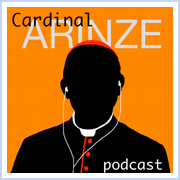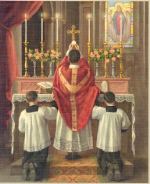From: Matthew 10:1-7The Calling and First Mission of the Apostles[1] And He (Jesus) called to Him His twelve disciples and gave them authority over unclean spirits, to cast them out, and to heal every disease and every infirmity. [2] The names of the twelve apostles are these: first, Simon, who is called Peter, and Andrew, his brother; James the son of Zebedee, and John his brother; [3] Philip and Bartholomew; Thomas and Matthew the tax collector; James the son of Alphaeus, and Thaddaeus; [4] Simon the Cananaean, and Judas Iscariot, who betrayed Him.
[5] These twelve Jesus sent out, charging them, "Go nowhere among the Gentiles, and enter no town of the Samaritans, [6] but go rather to the lost sheep of the house of Israel. [7] And preach as you go, saying, `The Kingdom of Heaven is at hand.'"
***************
Commentary:1-4. Jesus calls His twelve Apostles after recommending to them to pray to the Lord to send laborers into His harvest (cf. Matthew 9:38). Christians' apostolic action should always, then, be preceded and accompanied by a life of constant prayer: apostolate is a divine affair, not a merely human one. Our Lord starts His Church by calling twelve men to be, as it were, twelve patriarchs of the new people of God, the Church. This new people is established not by physical but by spiritual generation. The names of those Apostles are specifically mentioned here. They were not scholarly, powerful or important people: they were average, ordinary people who responded faithfully to the grace of their calling--all of them, that is, except Judas Iscariot. Even before His death and resurrection Jesus confers on them the power to cast out unclean spirits and cure illnesses--as an earnest of and as training for the saving mission which He will entrust to them.
The Church reveres these first Christians in a very special way and is proud to carry on their supernatural mission, and to be faithful to the witness they bore to the teaching of Christ. The true Church is absent unless there is uninterrupted apostolic succession and identification with the spirit which the Apostles made their own.
"Apostle": this word means "sent"; Jesus sent them out to preach His Kingdom and pass on His teaching.
The Second Vatican Council, in line with Vatican I, "confesses" and "declares" that the Church has a hierarchical structure: "The Lord Jesus, having prayed at length to the Father, called to Himself those whom He willed and appointed twelve to be with Him, whom He might send to preach the Kingdom of God (cf. Mark 3:13-19: Matthew 10:1-10). These Apostles (cf. Luke 6:13) He constituted in the form of a college or permanent assembly, at the head of which He placed Peter, chosen from among them (cf. John 21:15-17). He sent them first of all to the children of Israel and then to all peoples (cf. Romans 1:16), so that, sharing in His power, they might make all peoples His disciples and sanctify and govern them (cf. Matthew 28:16-20; Mark 16:15; Luke 24:45-48; John 20:21-23) and thus spread the Church and, administering it under the guidance of the Lord, shepherd it all days until the end of the world (cf. Matthew 28:28)" ("Lumen Gentium", 19).
1. In this chapter St. Matthew describes how Jesus, with a view to the spreading of the Kingdom of God which He inaugurates, decides to establish a Church, which He does by giving special powers and training to these twelve men who are its seed.
5-15. After revealing His intention to found the Church by choosing the Twelve (verses 1-4), in the present passage He shows that He intends to start training these first Apostles. In other words, from early on in His public ministry He began to lay the foundations of His Church.
Everyone needs doctrinal and apostolic training to follow his Christian calling. The Church has a duty to teach, and the faithful have a parallel duty to make that teaching their own. Therefore, every Christian should avail of the facilities for training which the Church offers him--which will vary according to each person's circumstances.
5-6. In His plan of salvation God gave certain promises (to Abraham and the patriarchs), a Covenant and a Law (the Law of Moses), and sent the prophets. The Messiah would be born into this chosen people, which explains why the Messiah and the Kingdom of God were to be preached to the house of Israel before being preached to the Gentiles. Therefore, in their early apprenticeship, Jesus restricts the Apostles' area of activity to the Jews, without this taking from the world-wide scope of the Church's mission. As we will see, much later on He charges them to "go and make disciples of all nations" (Matthew 28:19); "Go into all the world and preach the Gospel to the whole creation" (Mark 16:16). The Apostles also, in the early days of the spread of the Church, usually sought out the Jewish community in any new city they entered, and preached first to them (cf. Acts 13:46).
*********************
Source: "The Navarre Bible: Text and Commentaries". Biblical text taken from the Revised Standard Version and New Vulgate. Commentaries made by members of the Faculty of Theology of the University of Navarre, Spain. Published by Four Courts Press, Kill Lane, Blackrock, Co. Dublin, Ireland.
Reprinted with permission from Four Courts Press and Scepter Publishers, the U.S. publisher.









